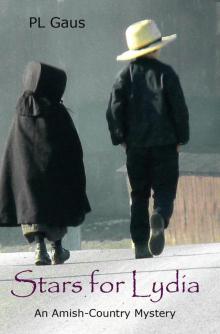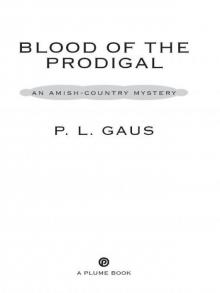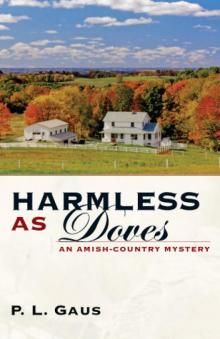- Home
- P. L. Gaus
Whiskers of the Lion Page 12
Whiskers of the Lion Read online
Page 12
Cal smiled. “If they paint all the shiny parts black, then yes, they’re called Black Bumper Amish. Other New Order Amish people just buy the plainest car they can find, and they don’t worry about any shiny parts. They don’t paint the chrome and silver parts to be flat black.”
“OK,” Armbruster said, “but Fannie’s brother Jonas didn’t have any kind of car at all, so they can’t be New Order.”
“Right,” Cal said. “That’s my point. The Helmuths stayed with the Old Order. They never went modern.”
“I remember they had a lawn mower,” Armbruster said. “A power mower.”
Cal shrugged at the inconsistency.
“So, are they Old Order?” Armbruster asked.
“One particular kind of Old Order,” Cal said. “They’re the kind of Old Order who still won’t have any fellowship with the New Order, but who have accepted some modern conveniences, nonetheless.”
“Nobody could sort this all out,” Wilsher said at the coffeepot. He poured himself another cup and added, “They can’t possibly keep track of it all.”
Cal stood up and stretched his arms and shoulders. “But they do keep it all sorted out, Dan. They keep track of it all. They watch each other. Some of them will use a gasoline weed whacker, and others, right next door, won’t allow it. But they all know who does, and it makes a distinction for them.”
Robertson joined Wilsher at the coffee credenza to pour himself a cup. “What you’re saying, Cal, is that Fannie is Old Order, but not the extremely backward Schwartzentruber type.”
Cal moved aside to let Robertson reclaim his place at the desk. Robertson sat in his chair, sipped his hot brew, and asked, “Would any of this have had an influence on her travel destinations over the last four months?”
“She’ll have accepted rides with New Order Amish families,” Cal said. “If they could take her where she wanted to go.”
“But she won’t let herself own a car?” Lance asked.
“Right. She won’t own one, and she won’t drive one. But her rules don’t say that she can’t ride in one. And she will probably accept a ride from anyone in a congregation who is going her way.”
“Would she fly in an airplane?” Captain Newell asked.
“Probably not.”
Missy asked, “Will she testify for the FBI against Teresa Molina?”
“Probably not.”
“Does the FBI know that, Bruce?” Missy asked her husband.
Robertson shook his head. “I’m not going to tell them that, Missy. It’s just Cal’s opinion.”
Newell asked, “Does Fannie know that Howie Dent is dead?”
“Mike and Caroline are going to tell her, Bobby,” Robertson said. “Maybe they already have.”
Wilsher asked Newell, “Bobby, have you found anything more at the Helmuth farm?”
“No,” Newell said. “But, like what? Fingerprints?”
“Or trace evidence,” Wilsher said. “Fibers or hairs.”
Newell shook his head, and Wilsher asked Missy, “How about something on the body?”
“Nothing that we can use, Dan. Nothing definitive.”
“What is the FBI doing?” Rachel asked. “How much do they know?”
Robertson answered. “They’re waiting at a hotel west of Middlefield, for me to call. To tell them where Fannie is.”
“Is that where they’ll guard her?” Rachel asked.
“That’s the agreement I have with them,” Robertson said. “They’ve agreed to my terms for a transfer of custody.”
Cal had moved to the door. “Does the rest of this involve me?”
“No, but thanks, Cal,” Robertson said. “Can you think of anything else that we need to know?”
Cal took a moment and then said, “I’ve been thinking about your plan.”
“And?” Robertson asked.
“And she may be Old Order, Bruce, but that doesn’t mean that she’s backward or hesitant.”
“What do you mean?” Robertson asked.
Cal arched his brows. “It means, I think, that if you’ve told her enough in your letter, you can depend on her to do the best thing.”
“I hope so, Cal. If she doesn’t, she’ll never be safe again.”
• • •
After Cal had left, people stirred in the room, pouring coffee for themselves, changing to different seats or positions, and waiting for the sheriff to start again. Dan Wilsher excused himself so that he could manage his afternoon patrols. Rachel left to check on her searches for Teresa Molina in criminal arrest databases.
When the sheriff returned from a brief visit with Del Markely at the front counter, he stood just inside his office door and reviewed, with the remaining people, the details of the plan he had devised for Pat Lance and Fannie Helmuth. When he had finished, he asked, “Do you all know what to do?”
Bobby Newell answered first. “When Dan’s ready, he and I will take deputies over to the hotel. I’ve gone over most of the preliminaries with hotel management. Some doors to corridors will be locked, and some will remain open. We’ll decide where we need to post our guards. We should be ready by early evening.”
“Good,” Robertson said. “And Pat? Are you and Stan ready to leave?”
“We are,” Lance answered.
“I don’t have any details yet,” Armbruster said.
“Pat can fill you in,” Robertson said. “But you two should get started. I don’t want to call the FBI until you’re ready to start back to Millersburg.”
Armbruster headed out the door without further comment. Lance followed with her valise.
Deputy Ryan Baker asked, “Sheriff, are you really going to give Fannie to the FBI?”
“Ryan,” Robertson said, “I’d rather frolic in a minefield. But for the time being, yes I am.”
“What about Teresa Molina?” Missy asked her husband.
“That’s going to have to be the FBI’s problem, Missy. Our focus has to be local.”
“That could take a while,” Missy said, standing to leave.
“We’re gonna give it three or four days,” the sheriff said. “We won’t be able to keep up the charade much longer than that.”
18
Thursday, August 18
3:30 P.M.
AT THE somber pace of a dirge, the Brandens drove north out of Middlefield, following Abel and Irma Mast’s black buggy. In the lead, the Masts’ dappled mare was not encouraged to hurry. Rather, the pace was torturously slow. So at first, Branden rode the brakes. After a mile, he devised the method of bringing his car to a complete stop to let the buggy advance a hundred yards before he shifted into gear to close the distance without leapfrogging the buggy.
The road ran straight north. The berm was only modestly wide, and Mast kept his rig on the blacktop. Cars and trucks came up behind the Brandens and passed as soon as possible, some punching their horns impatiently. Still Mast held to an unhurried pace, and clouds began to gather on the horizon.
Everywhere north of Middlefield, the Brandens saw sprawling and prosperous farms, the evidence of a capable and industrious people. At one farm, a matched trio of brothers was offloading slab wood from an old wagon hitched to draft horses. At the next farm, a grandfather was scooping manure out of a barn using a gasoline-powered front loader with large tractor wheels. There were men chopping firewood for winter, mothers or daughters mowing expansive front lawns, and older children trimming the weeds in the ditches beside the road. At many of the farms, laundry hung in the breeze under second-story porches, or from clotheslines strung beside the houses. At each of the farms, there was something for the kids. Teeter-totters, swing sets, tetherball poles, sandboxes, or trampolines were set on the lawns.
Eventually, the Brandens turned right onto a lesser road, following the Mast buggy past the one-room Pleasant Valley School. Just east of the scho
ol, on the other side of the road, they pulled into a long gravel drive. The professor followed Mast around to the back of a two-and-a-half-story white frame house, and he parked his sedan on the gravel patch between the back of the house and a tall white barn. At the corner of the barn, a pair of concrete silos rose nearly fifty feet high. In front of the silos, an old green tractor was parked on blocks, with its wheels taken off, and the power drive at the back of the tractor was engaged with a belted conveyor that Mast apparently used to loft grain and hay into either the silos or the barn.
As he climbed out, Professor Branden noted the immovable tractor and said, “They’re using engines, Caroline. So they’re not conservative Old Order. But they’re not New Order, either.”
Standing on the stoop, Abel Mast waved the Brandens forward toward the back porch. They followed him inside, crossed a screened porch to a spacious kitchen, and took seats on a bench at a long kitchen table made of polished pine planks. Mast then spoke in Dietsch dialect to his wife, and she went back out through the porch and down the steps to cross the gravel to a Daadihaus that was situated to the back of the yard. Through the kitchen windows, the Brandens watched her knock on the Daadihaus door and enter directly. When Abel Mast spoke, they turned back to face him in the kitchen.
“My wife will tell her,” Mast said as he stepped to the sink. He took two glasses out of an overhead cupboard, pumped water at the sink, and handed full glasses of cloudy brown water to the Brandens.
“You’ll be thirsty,” he said. He sat across from them at the pine table. “A buggy ride makes for thirsty work.”
“So does delivering bad news, Abel,” the professor said. “You didn’t seem hurried. We took our time getting here.”
“We were talking,” Mast replied. “We were trying to find a gentle way to tell Fannie about Howie.”
“I don’t think there is a gentle way,” Branden said. He drank the silted water that Mast had offered him. “Thanks for the water.”
Mast lingered with his thoughts. Eventually he noticed that Caroline had sipped her water to be polite, but had not finished it. Mast attempted a smile, and he pushed up wearily from the table, saying, “Well water is disagreeable to some folk.”
Caroline replied softly, “It’s OK, Mr. Mast.”
“Would you prefer bottled?” Mast asked as he returned to the sink. He opened the cupboard under the sink and produced a plastic bottle of Dasani. “We get it at Walmart,” he said, and he sat back down at the table. He handed the bottle across to Caroline. “That’s the only thing my wife will drink.”
Caroline opened the Dasani and drank gratefully. Mast took up her glass of well water and finished it himself. When he was carrying the empty glass back to the sink, Mrs. Mast came in from the back porch with Fannie Helmuth.
Caroline and the professor rose and stepped out over the low bench to greet Fannie. Mrs. Mast cast them a glance of caution. Fannie took one step into the large kitchen and stood wringing her fingers into a white handkerchief.
In her mid-twenties, Fannie Helmuth was a round and stocky woman. Her large brown eyes, set wide over a thin nose, carried a tearful sheen of distress. Her small mouth curved down at the corners, and her lips were quivering. Her gold wire spectacles seemed to have been dislodged by the news Irma Mast had brought her, and they sat low on her nose. She peered at the Brandens over the tops of the lenses, and she seemed disinclined to bother with the triviality of adjusting them. The spectacles hung from her ears like frames for a crestfallen soul.
As she tried to gather herself to speak, Fannie searched back and forth between the Masts standing at the sink and the Brandens standing at the table. She seemed to be looking for some gentle assurance that their cruel joke about Howie Dent had played out long enough to suit them. That they would surely now relieve her sorrow with a laugh or a smile. When she realized that they could not relieve her, Fannie began to cry.
Fixed wordlessly to her place inside the kitchen door, without raising her handkerchief to her eyes, Fannie let her tears stream down her cheeks. She dropped her handkerchief to the floorboards and stood motionless, blinking at tears that she was unable to dry. Lost in her grief, Fannie appeared also to have lost her place in the world. She seemed unaware of where she was. She began to waver on her feet. She closed her eyes and held out a hand as if she were reaching for a railing on which to lean. As if she were searching for a support that would stop her fall.
Caroline reached out for Fannie’s hand and took it. With her other hand, she steadied Fannie’s elbow and guided her forward to the bench at the kitchen table. Carefully, Caroline turned Fannie around to sit on the bench with her back to the table. With her eyes still closed, Fannie accepted Caroline’s help to sit on the bench. Once seated, she clung to Caroline’s hand and wept.
When Fannie at last opened her eyes, she whispered. “He promised he would be careful. He promised he would just get his car. Then come back.”
“He did get his car, Fannie,” the professor said. He sat on the end of the bench and took Fannie’s other hand. “Someone must have been watching for him,” he said. “We don’t think he had much of a chance.”
Fannie seemed to notice the professor for the first time. “I don’t know you,” she said, and she pulled her hands free.
“I have a letter for you, Fannie,” Branden said. “From Sheriff Robertson. He has been trying to find you.”
“You’re not a deputy.”
“A reserve deputy,” Branden said, and he displayed his wallet badge.
Fannie glanced at the badge and asked, “Why are you dressed like that? You’re not Amish.” She indicated Caroline. “And she’s not Mennonite.”
“No,” Branden said. “We thought it might take a long time to find you. We were worried that people here wouldn’t trust us.”
“But how did you find me?”
Branden explained about searching the letters in the Budget, and Fannie began to cry again. Stammering, she said, “Howie wanted our families to know we were safe. It probably didn’t work.”
“It worked, Fannie,” Caroline said. “Howie’s mother saw the letters.”
Fannie seemed puzzled by Caroline’s presence, so the professor explained. “Fannie, this is my wife, Caroline. We want to help you move to a safer place.”
Fannie shook her head. “Tell me how he died.”
“He was murdered,” the professor said. “At your brother’s house.”
Crying again, Fannie said, “He wasn’t supposed to go there. He promised me he wouldn’t go there.”
Suddenly, Fannie stood. “She can’t have been waiting there for him! Not all this time. Nobody could be that angry.”
Caroline stood to embrace her, but Fannie jerked away. Turning to the Masts at the kitchen sink, she demanded, “Why did you bring them here, Abel? We would have been safe!”
Mast took a step toward Fannie. “They found you, Fannie. They found you easily enough, and it’s a good thing it was the sheriff. Someone else could do the same thing.”
“We don’t even know them, Abel!” Fannie cried angrily.
Mast shook his head. “They have a letter for you from the sheriff. And this man has a badge. You need their help, now, Fannie. You are too easy to find.”
“I’m not!” Fannie shouted back at him. “And I have Reuben.”
Gently, Mast asked, “How is he going to be able to keep you any safer than Howie did?”
Fannie wrenched her shoulders as if she were caught in a net. As if she wanted to flee, but something unseen was preventing her escape. She stumbled backward and braced herself at the table’s bench. She pulled her organdy Kapp away from her hair and balled it up in her fist to hurl it across the room. She cocked her arm and swung. But she did not release the Kapp. Instead, she pressed her fists angrily to her temples and shook side to side, trembling with tension and grief. Her hair fell loose from its b
un, and it spilled down her back. She dropped her Kapp and tangled her fingers into her hair, pulling fiercely at its roots. Keening a pitched wail, she began to shout, “No! No! No!”
Caroline reached out to try to calm her, but Fannie turned and bolted through the kitchen door. She crossed the back porch, ran down the back steps, and stumbled toward the Daadihaus. Irma Mast hurried after her.
Fannie stumbled in the gravel before she got to the Daadihaus. Down on her knees, she screamed, “Howie!”
Irma tried to pull Fannie to her feet, but Fannie pushed her off, stood, and paced a tight circle of frustration and rage, pulling wildly at her hair. From a barn far to the back of the property, Fannie’s fiancé Reuben ran to her and wrapped his arms over hers, to pin them at her sides. Thrashing in his arms, Fannie struggled to free herself. Gradually, she tired. Then Reuben embraced her and stroked her long brown hair. But Fannie’s legs folded under her, and she fell slowly to the gravel, pulling Reuben down with her. Time and again, Fannie cried out, “Howie!” first and then, “Reuben!” as Irma and Reuben struggled to lift her back to her feet.
• • •
Abel and Caroline went out to help with Fannie, but the professor remained in the kitchen to call Stan Armbruster’s cell phone. Armbruster answered on the second ring. “We’re on our way, Professor. We’re on the 271 outer belt, coming up to Solon.”
“OK,” Branden said. “You should be here in about forty minutes. The mailbox out front says number 15901 on the Burton-Windsor Road, north of Middlefield. We’re near a school, but across the street.”
“So, did you find her?” Armbruster asked.
“Yes, but she’s losing it, Stan. You need to hurry. This is the Mast farm. It’s Abel and Irma Mast. But there’s another Amish man here, too. She’s calling him Reuben.”
“Pat’s driving,” Armbruster said. “We’ll run with flashers. Is that address going to register on our GPS?”
“It should.”
“Forty minutes?”

 Stars for Lydia
Stars for Lydia Cast a Blue Shadow
Cast a Blue Shadow Separate from the World
Separate from the World Clouds without Rain
Clouds without Rain Blood of the Prodigal
Blood of the Prodigal Whiskers of the Lion
Whiskers of the Lion A Prayer for the Night
A Prayer for the Night Broken English
Broken English Harmless as Doves: An Amish-Country Mystery
Harmless as Doves: An Amish-Country Mystery